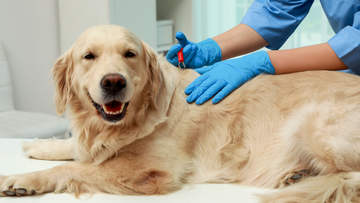Dogs have a heartwarming way of showing us their love. They nudge us with their wet noses, wag their tails joyfully—and sometimes... they give us a wide, toothy grin that simply melts any heart. But when that happy expression is accompanied by an unpleasant whiff of bad breath, it could be a sign of a sometimes very painful problem. Dental problems are common in dogs, but often underestimated by owners. Today, you'll learn why your dog's dental care is more than just cosmetic—it's an essential part of their overall health.
Why is dental care so important for dogs?
First, let's debunk a myth: Dogs aren't "little wolves" who can survive without teeth cleaning. Yes, wild animals often chew on bones and bark, which has a certain cleaning effect. But they also suffer from dental problems—we just don't see it because they don't have doctor appointments in the wild. Your furry friend at home, however, has the luxury of living longer—and therefore, their teeth need special care.
Poor dental hygiene not only leads to bad breath (which your dog will lovingly blow in your face), but also to serious problems like tartar, gingivitis, and ultimately tooth loss. Not only that, but bacteria from the mouth can spread through the bloodstream and attack internal organs. Below, you'll learn more about the potential impact dental problems can have on your dog's overall health.
1. Inflammations and infections
Gum inflammation (gingivitis) is a common complication of dental problems. When the gums are inflamed, the infection can easily spread to other parts of the body. Bacteria that accumulate in the mouth are transmitted throughout the body via the bloodstream. This can lead to further inflammation in important organs such as the heart, liver, and kidneys 1 .
2. Pain and behavioral changes
Dental problems cause pain and discomfort, which can negatively impact your dog's behavior. Dogs with dental problems often show signs of restlessness, loss of appetite, or changes in behavior. They may become withdrawn, less active, or stop playing—all signs that something is wrong.
3. Gastrointestinal problems
If your dog suffers from dental problems, this can also affect their ability to eat properly. Difficulty chewing can prevent them from breaking down their food sufficiently, which can lead to gastrointestinal problems such as vomiting or diarrhea. Inadequate food intake can also lead to poor nutrient intake.
4. Heart disease
The connection between dental health and heart health is well-documented 2 . Bacteria that enter the bloodstream from infected gums can attach to the heart valves and cause inflammation. This can lead to serious heart disease, which places significant strain on the cardiovascular system and, in the worst cases, can ultimately lead to heart failure.
5. Impairment of kidney function
The kidneys are responsible for detoxifying the body, and if bacteria enter the bloodstream through the gums, they can also damage the kidneys. Chronic dental problems can therefore lead to reduced kidney function in the long term, resulting in further health complications.
You see, dental problems in dogs are more than just a cosmetic concern; they can have serious health consequences. Does all this sound frightening? It is, but don't worry—with the right methods, you can significantly improve your dog's well-being. If you notice signs of existing dental problems in your dog, don't hesitate to consult a veterinarian immediately.
How do you recognize dental problems in dogs?
Before we get to the solutions, we should know the signs of dental problems:
-
Bad breath: A slight bad breath is normal, but if your dog's breath smells strong, tartar or inflammation could be the cause.
-
Red or swollen gums: Healthy gums should be pink. Inflamed gums may indicate gingivitis or periodontitis.
-
Tartar: Yellow or brown deposits on the teeth that are hard and irregular.
-
Difficulty chewing: If your dog avoids hard treats or chews only on one side, this could be a sign of toothache.
-
Tooth loss: In advanced cases, teeth may fall out.
Methods for dental care of your dog
Now that we know the risks, let's talk about prevention. Here are some proven methods to keep your dog's teeth clean and strong:
1. Toothbrush and dog toothpaste
Yes, you read that right—your dog needs his own toothbrush and toothpaste. Never use human toothpaste, as it can contain ingredients like xylitol, which are toxic to dogs. Instead, there are special dog toothpastes with chicken, beef, or peanut butter flavors that will teach your dog not to view the toothbrush as the enemy.
How often should you brush your dog's teeth?
Ideally, you should brush your dog's teeth daily. If that's not possible, aim for at least three to four times a week. Start slowly and make brushing time a positive experience—perhaps with lots of treats and praise so your dog understands that brushing is fun.
2. Chew snacks and chewing roots
Chews are not only a tasty treat, but also a great way to reduce tartar and plaque. Make sure the treats aren't too hard to avoid tooth damage. Coffee wood or antler pieces are often recommended as chews because they don't splinter, but both are unsuitable because they're so hard that your dog's teeth can break while chewing. Instead, offer your pet beef hide bones, chicken necks, rabbit ears, or lamb ears. These are relatively soft, don't splinter, and help reduce plaque and tartar. Look for natural versions without additives.
3. Dental care gels and sprays
For dogs who absolutely cannot tolerate a toothbrush, there are special dental care gels and sprays that are simply applied to the gums. These products contain enzymes that help break down plaque and reduce the number of bacteria in the mouth.
4. Regular veterinary check-ups
Even if you brush your dog's teeth diligently, annual checkups with the veterinarian are still a must. Your veterinarian can perform a thorough examination and, if necessary, recommend a professional dental cleaning. This is performed under anesthesia to thoroughly remove all plaque and tartar.
The importance of nutrients for dental health
A healthy diet forms the foundation for your dog's dental health. Just like with humans, the stability and resilience of dogs' teeth, as well as the health of their gums, depend heavily on the nutrients they regularly consume through their diet. Certain vitamins, minerals, and fatty acids play a key role and should be included in a balanced dog diet. Let's take a closer look at the most important nutrients and why they are essential for your four-legged friend's dental health.
1. Calcium
Calcium is the main building block of teeth and bones. A calcium deficiency can lead to weak teeth, which are more prone to fractures and tooth loss. Make sure your dog's food has a balanced calcium content, especially if you prepare your dog's food yourself.
2. Omega-3 fatty acids
Omega-3 fatty acids, especially EPA (eicosapentaenoic acid) and DHA (docosahexaenoic acid), are believed to have powerful anti-inflammatory properties. They can support gum health by reducing inflammatory processes in the body, including the oral cavity. Omega-3 fatty acids can help prevent the progression of such inflammation and promote gum regeneration. Natural sources of omega-3 fatty acids include fish oil, flaxseed, and algae.
3. Vitamin C
Vitamin C promotes the production of collagen, a protein that plays a key role in the stability of the gums and surrounding connective tissue. Strong connective tissue ensures that the teeth remain firmly anchored in the jaw. Vitamin C also acts as an antioxidant and protects against cell damage caused by free radicals, which can also promote inflammatory processes. Since dogs can normally synthesize vitamin C in their bodies, a deficiency is rare, but in special cases such as stress or illness, supplementation may be beneficial.
4. Zinc
Zinc is an essential trace element required for healthy cell division and wound healing. In dogs, zinc supports the resistance of gums to bacterial attack and can thus help reduce the risk of infections and gingivitis. Zinc is also important for the immune system, skin, and mucous membranes—including the oral mucosa.
5. Vitamin E
Vitamin E acts as a powerful antioxidant and protects cells from oxidative stress. This is especially important for preventing inflammation and tissue damage in the gums. A vitamin E deficiency can lead to a higher susceptibility to gingivitis, which in turn weakens tooth stability. Because vitamin E is fat-soluble, it should always be administered in the diet with a sufficient amount of healthy fats for optimal absorption.
6. Collagen
Collagen is an important protein that strengthens the structure and elasticity of the gums. It ensures that the gums remain strong yet flexible enough to withstand the mechanical stresses of chewing. Collagen can support the regeneration of damaged gum tissue and thus help maintain long-term oral health.
7. Beta-carotene
Beta-carotene, a precursor to vitamin A, is important for mucous membrane function and supports your dog's immune system. A healthy immune system helps fight off oral infections and keep gums strong. Beta-carotene is found in plant sources like carrots and sweet potatoes and is converted into the active vitamin A by your dog's body.
8. Probiotics
Probiotics are live bacterial cultures that maintain the balance of natural flora in the body—including your dog's mouth. A healthy oral flora is crucial for inhibiting the growth of harmful bacteria that can cause plaque and tartar.
How do I incorporate these nutrients into my dog's diet?
Most commercial dog foods are formulated to meet your dog's nutritional needs. However, if you cook your dog's food from scratch or feed it raw, you should ensure the food is balanced. Occasionally, it may be beneficial to add a supplement specifically formulated for dogs—best after consulting your veterinarian.
Product recommendation: DENTES Dog® – For strong teeth and firm gums
DENTES Dog® was specially developed to support your dog's dental health from the inside out. This supplement contains a balanced combination of nutrients such as calcium, omega-3 fatty acids, and zinc, which can contribute to maintaining a healthy oral flora. The vital substances it contains support your dog's teeth and gums and can help strengthen tooth structure and promote the entire chewing system.
Why DENTES Dog® ?
DENTES Dog® Provides important nutrients that strengthen teeth and gums from within. Calcium ensures stable tooth structure, while omega-3 fatty acids have an anti-inflammatory effect and can reduce the risk of gum disease. The powder can be easily mixed into daily food and is an ideal addition to the dental care routine.
It's ideal for dogs of all ages who are naturally prone to dental problems or who are already showing slight signs of tartar and plaque. DENTES Dog® is also suitable for dogs who don't like having their teeth brushed. Excellent support - for strong teeth, firm bite and a radiant dog smile.
Myths and facts about dental care for dogs
-
“Dogs that eat dry food do not need dental care”
Although dry food has a slightly abrasive effect on the teeth, it is not enough to completely remove plaque and tartar. -
“Raw bones are the best dental care”
Yes and no. Bones can indeed help keep teeth clean, but hard bones can also cause tooth fractures. If you give your dog bones, choose soft, meaty bones (like chicken necks) that are easy to chew. -
“When my dog eats and plays, his teeth are okay”
Dogs are masters at hiding pain. Many dogs continue to chew despite toothache, so owners often don't recognize the problem. Regular checkups and dental care are therefore essential.
Conclusion: Dental care as a token of love
You might not immediately think of it, but caring for your dog's teeth is a direct expression of your care. It not only ensures a beautiful smile, but also keeps your four-legged friend fit and healthy. Start dental care early and make it a regular part of your routine. After all, you want your dog to walk up to you with that big, happy smile for many years to come, right?
So, grab your toothbrush and get started! Your dog will thank you – maybe not directly with the brushing, but with a content, pain-free, and happy life.
Sources:
1 Buck, Dr. M. (2015): Management of periodontitis in dogs – an update for practice. veterinary SPIEGEL. Enke Verlag. 3: pp. 124–129.
2 Thieme Vet (2024): Tips for healthy dog teeth (https://vet.thieme.de/aktuelles/vet-news/detail/tipps-fuer-gesunde-hundezaehne-1433)












